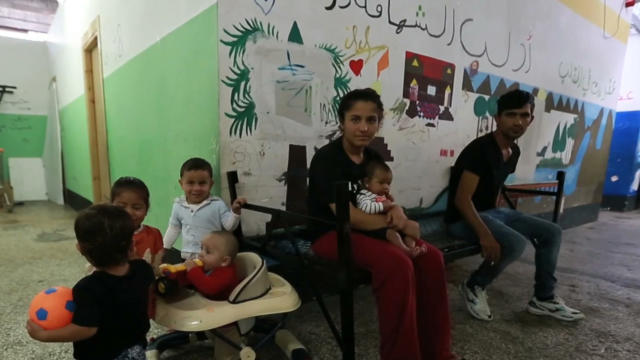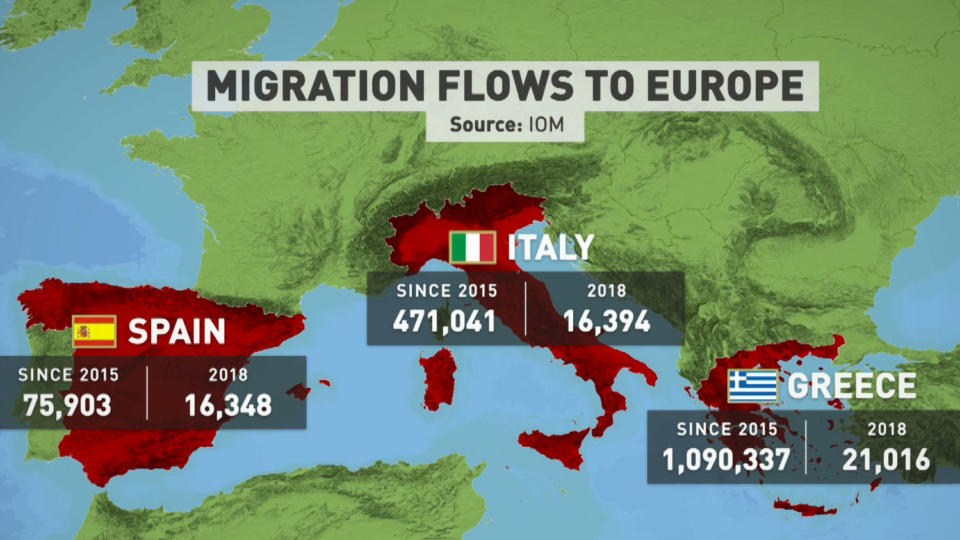Europe is looking for ways to resolve the migrant flow to the continent and the crises that triggered it. Three countries are on the front line of those arrivals: Spain, Italy and Greece. However, Greece is absorbing the most. CGTN’s Filio Kontrafouri reports.
Some 21,000 migrants have entered Greece so far this year, but more than a million have come in since 2015. Meanwhile, the country is still trying to recover from a long, economic meltdown.
Police checks at Greece’s largest airport are intense and around the clock. Passengers are inspected the moment they arrive at the Athens International Airport. Specially-trained police scan the area for smugglers and asylum seekers they suspect may try to sneak on a flight to Europe on a fake passport.
Police also perform selective passport checks on people traveling to Europe’s Schengen countries. These areas have no border controls. Every day, dozens of migrants and refugees try to illegally get to Europe from Greece’s airports, and dozens more are stopped.
“The Greek police has developed a special operational action plan for travel within the Schengen area with four security zones. So for someone to travel from the Athens International Airport to another EU member state with fake travel documents I’d say is impossible. And the results of this plan are impressive,” Police Colonel Michail Sdoukos of Athens International Airport said.
Europe has been closing its borders tighter to refugees, but arrivals by sea (to the Greek islands from Turkey) continue at a rate of about 80 per day. The U.N. Refugee Agency reports that Greece currently hosts 58,000 migrants and refugees.
Most migrants still deem the country a transit point, either because they have relatives elsewhere in Europe or because Greece (compared to other EU countries) provides them with limited opportunities and assistance.
An abandoned factory was turned into a camp during the 2015 refugee crisis, and closed less than two years later. The government hastily reopened it in March, along with other camps across the country. At the moment, the factory serves as a temporary accommodation for the growing number of asylum seekers reaching Greece.
CGTN was the first TV crew allowed to film the factory. Over 300 people, mostly from Syria, live in tiny rooms shared by entire families. The government provides them three meals a day, and gives them a small allowance to buy extra food every month.
Many migrants at the factory still lack basic needs. Mohamad from Afrin didn’t even have pillows for his children or proper baby formula. The government is trying to make the camp more livable, but for refugees like Ibra Naqsh, there’s no time left to wait.
“If you want to look for a job, there’s no job. We want to continue to Europe to find a job there, it’s better than here, it’s not allowed. We’re stuck here,” Naqsh explained.
“We’re educated people. We’re looking for a better life. I’m going back to Turkey because unfortunately, I’m disappointed. I couldn’t find myself here. I’m sitting doing nothing. I don’t want to destroy my mind, I don’t want to be a lazy person. I don’t want to stay just fighting for food every morning, for one bottle of water.”
Europe’s border security agency, FRONTEX, said an alarming increase in crossings from the land border with Turkey has been driving asylum-seekers in Greece way up. Almost 20,000 refugees in total have arrived in Greece during the first five months of this year. Greece has become Europe’s main point of entry, followed by Italy.
Europe remains divided on the migration burden. If Greece is to cope with its massive share because of its geography, the task could soon become unbearable without the help of its European allies.
 CGTN America
CGTN America


